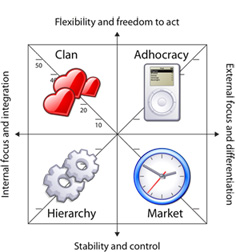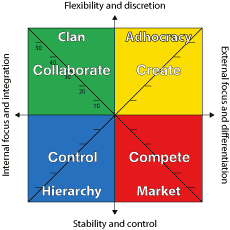
FRACTIONAL CONSULTING
Are you looking for a flexible and affordable way to quickly bring in additional real-world expertise, skills, and knowledge?

RISK AND RESILIENCE HEALTH CHECK
When did you last check that your risk and resilience processes are fit for purpose?
INSIGHT BLOG
Quick, easy, reliable resource to assess organizational culture
 Quick, easy, reliable resource to assess organizational culture: starting point for sustainable, successful change.
Quick, easy, reliable resource to assess organizational culture: starting point for sustainable, successful change.
We are pleased to announce that Chaordic Solutions has now partnered with now OCAI-Online to make the Organizational Culture Assessment Instrument (OCAI) available to our clients … a hassle-free, online based tool for diagnosing and helping to manage organizational culture.
Completing Values Framework
OCAI is a validated tool, used by over 10,000 companies worldwide. It is based on based on the highly respected work of Professors Robert Quinn and Kim Cameron, who are responsible for developing the Competing Values Framework.
Using an analysis of thirty-nine indicators for organizational effectiveness, Cameron and Quinn discovered two important dimensions within their data. From further analysis, they were able to identify four quadrants that corresponded with the four organizational culture types that they had found that differed strongly along these two dimensions … what they subsequently referred to as the Competing Values Framework:
Internal focus and integration VS External focus and differentiation
Stability and control VS Flexibility and discretion
To the left in the graph, the organization is internally focused: what is important for us, and how do we want to work? However, to the right the organization is externally focused: what is important for the outside world, the clients, and the market?
At the top of the graph, the organization desires flexibility and discretion, while at the bottom the organization values the opposite: stability and control.
Different Types of Culture
Every organization has its own mix of these four types of organizational cultures. This mix is found by the completion of a short questionnaire. This assessment is a valid method to examine organisational culture and the desire for change.
Successful organizational change is all about changing “the way we do things around here”: what you need is actual behavior change. Working with your workplace culture is an excellent way to create this kind of real change.
We believe the OCAI tool provides a very useful and powerful starting point for sustainable, successful organizational change. If you take the time for a serious dialogue about the outcome, you will achieve breakthrough results later on in the process.
Importance of Culture
For over 25 years we have been helping senior executives to cope with complex organizational change. Over this period, we have recognised the increasingly important role that culture plays in providing a foundation for success. Our recent research into the barriers to implementing an integrated approach to governance, risk and compliance (GRC) has provided tangible evidence to support this view.
In conjunction with our ongoing consulting activities, we are now researching this area in more depth as part of our doctorate research activities into how the culture of an organisation can be influenced to make it more receptive to enterprise-wide initiatives such as compliance as well as GRC itself. Our use of the OCAI tool is a key part of our consulting and research activities.
Next Steps
Contact our Senior Partner, Robert J Toogood via email or on +44 (0)1983 617241 to find out more about how you and your organisation can benefit from using this tool.
Sep 11 2013
Change ManagementCategory
- Business Continuity & Pandemic Planning (9)
- Business Transformation (102)
- Change Management (33)
- Compliance (24)
- Conduct Risk (8)
- GDPR (5)
- Governance (4)
- GRC (22)
- IRM GRC Special Interest Group (11)
- Mergers & Acquisitions (M&A) (13)
- News (3)
- Non-Executive Management (NEM) (1)
- Portfolio Management (8)
- Programme & Project Management (9)
- Risk Management (63)
- Solvency II (9)
- Strategy Implementation (34)
- Twitter (2)
- Uncategorized (2)



